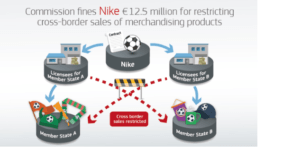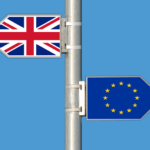The European Commission has fined Nike €12.5 million for banning traders from selling licensed merchandise to other countries within the EEA. This restriction concerned merchandising products of some of Europe’s best-known football clubs and federations, for which Nike held the licence.
Licensed merchandising products are extremely varied (e.g. mugs, bags, bedsheets, stationery, toys) but all carry one or more logos or images protected by intellectual property rights (IPRs), such as trademarks or copyright. Through a licensing agreement, one party (a licensor) allows another party (a licensee) to use one or more of its IPRs in a certain product. Licensors typically grant non-exclusive licenses to increase the number of merchandising products in the market and their territorial coverage.
Nike’s core business is the design and sale of athletic footwear and apparel, including for football clubs and federations, which generally feature Nike’s registered trademarks, such as its name or “Swoosh” logo. Other products, so-called “licensed merchandise”, only feature the brands of a football club or a federation, not Nike’s trademarks. For these products, Nike acts as a licensor of IPRs that grants licences to third parties, who become entitled to manufacture and distribute those products. It is in the context of Nike’s role as a licensor for the manufacture and distribution of these licensed merchandise products that the Commission is imposing a fine.
In June 2017, the Commission opened an antitrust investigation into certain licensing and distribution practices of Nike to assess whether it illegally restricted traders from selling licensed merchandise cross-border and online within the EU Single Market.
The Commission investigation has found that Nike’s non-exclusive licensing and distribution agreements breached EU competition rules:
- Nike imposed a number of direct measures restricting out-of-territory sales by licensees, such as clauses explicitly prohibiting these sales, obligations to refer orders for out-of-territory sales to Nike and clauses imposing double royalties for out-of-territory sales.
- Nike enforced indirect measures to implement the out-of-territory restrictions, for instance threatening licensees with ending their contract if they sold out-of-territory, refusing to supply “official product” holograms if it feared that sales could be going towards other territories in the European Economic Area (EEA), and carrying out audits to ensure compliance with the restrictions.
- In some cases, Nike used master licensees in each territory to grant sub-licences for the use of the different IPRs to third parties. To secure the practice through the whole distribution chain, Nike imposed direct and indirect measures on master licensees. Through these measures, Nike compelled master licensees to stay within their territories and to enforce restrictions vis-à-vis their sub-licensees.
- Nike included clauses that explicitly prohibited licensees from supplying merchandising products to customers, often retailers, who could be selling outside the allocated territories. In addition to obliging licensees to pass on these prohibitions in their contracts, Nike would intervene to ensure that retailers (e.g. fashion shops, supermarkets, etc.) stopped purchasing products from licensees in other EEA territories.
Nike’s cooperation
Nike cooperated with the Commission beyond its legal obligation to do so, in particular by providing the Commission with information that allowed it to extend the scope of the case. As a result, the investigation included ancillary sport merchandise of a number of additional clubs. The company also provided evidence with significant added value and expressly acknowledged the facts and the infringements of EU competition rules.
Therefore, the Commission granted Nike a 40% fine reduction in return for this cooperation. Further information on this type of cooperation can be found on the Competition website.
Fines
The fine was set on the basis of the Commission’s 2006 Guidelines on fines (see press release and MEMO). Regarding the level of the fine, the Commission took into account, in particular, the value of sales relating to the infringement, the gravity of the infringement and its duration, as well as the fact that Nike cooperated with the Commission during the investigation.
The fine imposed by the Commission on Nike amounts to €12 555 000.
Fines imposed on companies found in breach of EU antitrust rules are paid into the general EU budget. This money is not earmarked for particular expenses, but Member States’ contributions to the EU budget for the following year are reduced accordingly. The fines therefore help to finance the EU and reduce the burden for taxpayers.
Background to the investigation
In June 2017, the Commission opened three separate antitrust investigations to ascertain whether certain licensing and distribution practices of Nike, Sanrio and Universal Studios illegally restricted traders from selling licensed merchandise cross-border and online within the EU Single Market. The investigations against Sanrio and Universal Studios are on-going.
Nike’s manufacturing and distribution agreements for merchandising products infringed Article 101 of the Treaty on the Functioning of the European Union (TFEU), which prohibits agreements between companies that prevent, restrict or distort competition within the EU’s Single Market.
More information
Commission’s competition website
case register under the case number AT.40436.







Leave a Reply